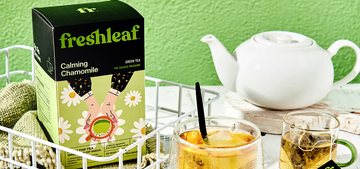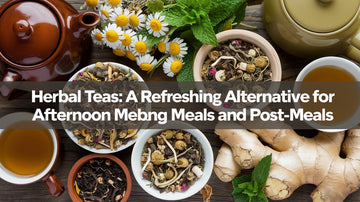Herbal Teas: A Refreshing Alternative for Afternoon Meals and post meals
by Lovlesh Saini on Apr 30, 2025
Afternoon meals can be tricky. It’s that time of day when you’re not quite hungry enough for a full meal but still need something to keep you going until dinner. A cup of tea often comes to the rescue, but let’s face it, the usual chai might not always be the best choice, especially if you’re looking to feel refreshed and not overly stuffed. In many Indian households, the afternoon meal is the day’s heartiest: dal, chawal, roti, sabzi, sometimes even pani puri as a mid-meal snack. No wonder digestion slows, energy dips, and focus drifts. Well, let’s talk about herbal teas, a tradition that marries flavour with function. The perfect afternoon pick-me-up that can satisfy your taste buds, calm your nerves, and provide you with that little burst of energy that you need to power through the rest of your day.
In India, tea culture runs deep. From street vendors brewing cutting chai to the elegance of sipping Darjeeling tea, we’ve got it all. But what about herbal teas? These blends, made from plants and flowers rather than traditional tea leaves, have been gaining popularity as a refreshing and health-boosting alternative. As William E. Gladstone aptly put it, “If you are cold, tea will warm you; if you are too heated, it will cool you; If you are depressed, it will cheer you; If you are excited, it will calm you.” Herbal teas do more than refresh: they help you digest, revive, and rejuvenate. And that’s what we’ll talk about.
What is Herbal Tea?
Herbal tea or tisane is not “tea” in the Camellia sinensis sense, but an infusion of herbs, spices, flowers, or fruits in hot water. Unlike black or green tea, most herbal infusions are naturally caffeine-free, making them ideal for a calming post-meal ritual without the jitters. They’ve been used for centuries in Ayurveda and folk traditions across India to address everything from indigestion to stress.
Herbal teas can vary from a sweet, floral taste to something more earthy and spicy. The ingredients can range from ginger, lemongrass, and chamomile to more exotic flavors like hibiscus and lavender. The best part? Herbal teas are caffeine-free, making them an ideal choice for afternoon refreshment without worrying about being too wired for a good night’s sleep later on.
Why choose herbal teas for your afternoon meal?
-
Digestive Support
One of the most significant reasons to opt for herbal teas is their digestive properties. After a hearty meal, our body works hard to digest everything we just ate. Sometimes, this process can leave us feeling sluggish, bloated, or just heavy. Herbal teas, like peppermint, ginger, and chamomile, are known to aid in digestion and soothe the stomach.
Take a sip of ginger tea after your lunch, and you’ll feel the warmth spread across your chest, easing that heavy feeling in your stomach. Ginger has been used for centuries to alleviate indigestion and promote better digestive health. Chamomile, on the other hand, is a natural relaxant and can help calm your digestive system, reducing bloating and discomfort. You’ll find that your energy levels remain stable, and you’re ready to tackle the afternoon without any discomfort.
-
Mental Clarity and Focus
Afternoon slumps are real. That period after lunch, when you feel a sudden dip in energy, can make it hard to stay productive. This is where herbal teas can come to the rescue. Unlike regular tea or coffee, herbal teas don’t contain caffeine (in most cases), but they do have natural compounds that help keep you alert without the jitters.
Peppermint tea, for example, is not only refreshing but also has invigorating properties that help clear your mind and boost your focus. If you need something to kickstart your brain after a heavy lunch, peppermint tea might just do the trick. Similarly, lemongrass tea has a crisp, citrusy flavour that can uplift your mood and enhance mental clarity, leaving you feeling refreshed and focused.
-
Hydration Without the Sugar
It’s easy to drink sugary sodas or artificially flavored drinks during the day, but those are often packed with empty calories that can make you feel sluggish. Herbal teas, on the other hand, hydrate you without the added sugar or artificial sweeteners. This is an important aspect, especially in India’s hot climate, where staying hydrated is key.
Herbal teas, such as hibiscus or rose tea, are naturally refreshing and don’t require additional sugar to make them palatable. Hibiscus, in particular, has a tart yet smooth taste, which is perfect for cooling you down and keeping you hydrated during the afternoon.
-
Weight Management
Herbal teas can also be a great choice for those mindful of their weight. Many herbal teas have properties that help with metabolism and fat burning. Green tea (though technically a “true” tea), for example, is often associated with weight loss due to its high antioxidant content and metabolism-boosting effects.
Herbal teas like dandelion can also support weight management by reducing bloating and acting as natural diuretics, helping your body flush our excess water. They won’t necessarily replace a balanced diet or exercise, but they can make a helpful addition to your weight management routine.
Traditional Indian Herbal Teas to Try
-
Tulsi (Holy Basil)
A sacred plant in Indian homes, tulsi tea is prized for its adaptogenic properties, helping the body manage stress, and its role in soothing upset stomachs. In animal studies, holy basil reduced stomach ulcers and promoted healing within 20 days.
This aromatic infusion blends green tea leaves with saffron, cinnamon, and almonds. Traditionally served hot after a heavy meal, it’s believed to aid digestion and warm he body in cooler climates, making it a winter afternoon favourite in the Valley.
-
Hibiscus
Known as “gul’sar” in many regions, hibiscus tea is tangy, vibrant, and loaded with antioxidants. Recent reporting highlights its diuretic effect and its ability to reduce inflammation and abdominal bloating when sipped after meals.
Lightly sweet and floral, chamomile tea contains apigenin, an antioxidant that binds to brain receptors to promote relaxation and many soothes the digestive tract. Many turn to chamomile for its anecdotal relief of gas, bloating, and nausea.
-
Peppermint, Ginger, Fennel
A trio renowned for digestive support: peppermint eases gas and cramps, ginger stimulates gastric motility, and fennel reduces bloating. Drinking this blend after lunch helps your body process spices and oils more comfortably.
Health Benefits of Herbal Teas
-
Aiding Digestion
Sipping peppermint or ginger tea post-meal can reduce discomfort and speed gastric emptying. Experts recommend one to three cups daily for optimal digestive health.
-
Boosting Immunity
Hibiscus and tulsi are rich in antioxidants and immune-supportive compounds. Hibiscus’s high vitamin C content helps neutralize free radicals, while tulsi’s adaptogens bolster resistance to infections.
-
Calming the mind
Chamomile’s gentle sedative properties and tulsi’s stress-modulating effects shift you into a “rest and digest” state, essential for both mental clarity and efficient digestion.
How to enjoy your herbal tea
Herbal teas are incredibly easy to make, but the way you enjoy them can elevate your experience. Instead of just boiling water and dunking a tea bag, try infusing your herbal tea with some extra flavors. A sprig of mint or a slice of lemon can add a whole new dimension to your tea. In India, we love adding a dash of honey or a pinch of ginger to our tea, this can bring out the natural flavors while offering extra health benefits.
For the perfect brew, steep your tea for the right amount of time. Oversteeping can make your tea taste too bitter, while understeeping may not extract the full flavors. As a general rule of thumb, herbal teas should be steeped for 5-7 minutes to get the best flavors.
How Freshleaf can be your best everyday tea choice
Here at Freshleaf, we believe in offering you the finest herbal teas that not only taste good but also bring health benefits with every sip. Our carefully curated range of herbal blends is designed to suit every mood, occasion, and health goal.
If you’re looking for something to help with digestion after that hearty Indian lunch, try our Chamomile Tea, which is known for its calming and digestive benefits. The Moroccan Mint Tea is a refreshing option if you’re looking for a clear mind and a burst of energy in the afternoon. And for those who crave a bit of spice, our Turmeric Ginger offers that perfect balance of warmth and refreshment. Whether you’re dealing with a busy afternoon or simply need to wind down, Freshleaf’s herbal teas offer something for everyone.
Our 6-flavour herbal tea collection includes:
-
Tulsi Treat: A pure holy basil infusion to calm the mind and gut.
-
Calming Chamomile: Soft, floral notes to unwind and aid digestion.
-
Turmeric Spiced: Turmeric for a lively post-meal kick.
-
Turmeric Ginger: Zesty ginger with a twist of citrus to settle the stomach.
-
Moroccan Mint: Cooling mint leaves to soothe and refresh.
-
Lemon Honey Delight: Gentle citrus sweetness with natural honey notes for immunity and taste.
Each sachet contains real ingredients, no artificial flavours or caffeine, so you can sip confidently after your midday feast.
Conclusion
In today’s fast-paced world, we often rush through meals and rely on caffeine-loaded drinks to stay alert. But what if there’s a better, healthier alternative? Herbal teas provide a delightful way to refresh your mind and body without any of the downsides of sugary sodas or heavy, caffeinated drinks. Whether it’s for digestive support, mental clarity, or just a refreshing break in your afternoon, herbal teas can be your go-to option.
At Freshleaf, we’re proud to offer a wide variety of herbal teas that cater to different tastes and needs. So, next time you’re figuring out what to sip after lunch, why not swap your regular cup of chai for a cup of something new and refreshing? Your body (and mind) will thank you.


